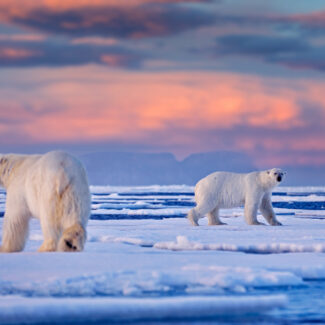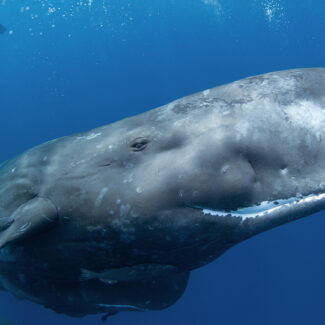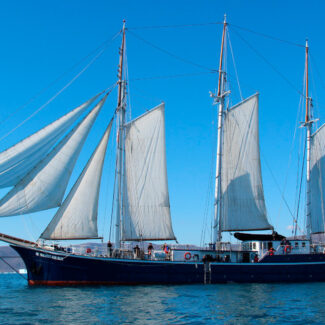Languages of Antarctica
- Languages of Popular Antarctic Embarkation Ports
- What Language is Spoken in Antarctica on Tours & Cruises?
- What Language is Spoken in the Falkland Islands, South Georgia, and the South Sandwich Islands?
- Languages Spoken in Antarctica at Research Bases
- The Antarctica Accent
- Impact On Antarctic Place Names
- Multilingual Antarctica
Unique among the globe’s continents, Antarctica lacks an indigenous human population. The White Continent proper wasn’t even definitively visited by people until the 19th century. It goes without saying, then, that there’s no native tongue here, and no official Antarctica language.
But between the South American ports and sub-Antarctic ports of call, to the conversations of your fellow cruise passengers, and the greetings you might receive when visiting a research base, a trip to Antarctica will likely expose you to some delightful lingual diversity.
Languages of Popular Antarctic Embarkation Ports
Before you step aboard, you’ll find that Spanish is the dominant language in the two most significant South American launchpads for Antarctic voyages: Ushuaia, Argentina and Punta Arenas, Chile. That said, English is extensively taught in both Argentina and Chile and therefore quite widely spoken if your Spanish is a little rusty (or non-existent!). If you’re thinking of traveling more widely in South America pre or post-Antarctica though, a good English-Spanish dictionary will serve you well and knowing a few basic Spanish phrases will be appreciated.
Before venturing to the frozen continent, many Antarctic expeditions begin in vibrant gateway cities like Punta Arenas, Chile! Here, the dominant language is Spanish, offering a rich cultural experience before embarking on your inspiring journey to the world’s southernmost reaches.
What Language is Spoken in Antarctica on Tours & Cruises?
Unsurprisingly, given it’s the most commonly spoken language in the world and the most prominent in international affairs, English predominates on Antarctic cruises and tours, but multilingual services are sometimes available, with select operators offering real-time translation of lectures using whisper devices into French, German, Japanese and Spanish, amongst others.
As ship staff are often sourced from South America, encounters with bilingual English-Spanish crew are common, but Spanish services on board and on excursion are not guaranteed, unless aboard the MV Ushuaia, the only vessel to include such services as part of their standard offering. In general, groups bring their own translator with them, but dedicated Mandarin-only departures tailored to Chinese groups are becoming more frequent.
Encountering these magnificent penguins with an expedition cruise ship in the background truly highlights the unique experiences awaiting you in Antarctica! Onboard, English is the predominant language for tours and briefings, ensuring clear communication and an inspiring, informative journey for all international travelers.
What Language is Spoken in the Falkland Islands, South Georgia, and the South Sandwich Islands?
For those cruise-goers undertaking longer expedition cruises that include visits to the various sub-Antarctic islands, you’ll find that English is the official language of the Falklands, having been settled by the French and British in the late 18th century, as well as in South Georgia and the South Sandwich Islands, which, like Antarctica, never supported a native human population. Spanish remains a significant minority language in the Falkland Islands as well.
Flying proudly, the flag of South Georgia and the South Sandwich Islands hints at the rich history and cultural influences in this captivating sub-Antarctic region. Here, and in the Falkland Islands, English is the official language, reflecting their fascinating ties and providing a familiar tongue amidst incredible wilderness.
Languages Spoken in Antarctica at Research Bases
From Pakistan to Bulgaria, from South Africa to Japan, better than 40 countries maintain close to 70 research bases in the Antarctic, anchoring a seasonal, science-oriented population that ranges from about 4,000 to 5,000 in summer to a thousand or so in winter. Examples of these research stations include McMurdo (the largest) and the Amundsen-Scott South Pole Station (both U.S.), Vostok Station (Russia), Esperanza Base (Argentina), and Davis Station (Australia).
The multinational character of Antarctica’s scientific operations shakes out to a wonderful plethora of languages spoken on the White Continent, from the bases themselves to the temporary field camps.
What is the most spoken language in Antarctica? English is the most widely used, partly because it’s the default lingua franca of the scientific world and partly because researchers from English-speaking countries—namely Australia, New Zealand, the U.S., and the U.K.—outnumber all others on the White Continent.
But the diversity of nations maintaining research bases—and the diversity of international researchers represented at individual stations—ensure that many other lingoes are prominent on the White Continent, and that there’s no main language in Antarctica. Hundreds of scientists here hail from Spanish-speaking countries, particularly Argentina but also Chile, Peru, Ecuador, Spain, and others. Other languages spoken in Antarctica include Russian, French, Chinese, Italian, Norwegian, Japanese, Dutch, and Czech—just to name a few.
How many languages are spoken in Antarctica? It’s impossible to say, but many dozens, surely—not counting the myriad tongues represented by the thousands of tourists who visit the bottom of the world each year.
At Antarctic research bases like this one, a true melting pot of languages can be heard! Scientists and support staff from around the globe collaborate, with English often serving as a common lingua franca alongside a diverse array of native tongues, all united by a shared passion for discovery in this inspiring continent.
The Antarctica Accent
While there may be no official language in Antarctica, amazingly a study published in the Journal of the Acoustical Society of America has suggested there to be an Antarctica accent evolving, albeit in its embryonic stages. The Antarctica accent has longer vowel sounds, and also involves a physical change too, with participants pronouncing the “ou” sound from the front of their mouths rather than the back of their throats.
Study author and Professor of Phonetics and Speech Processing at the Ludwig-Maximilians University of Munich, Jonathan Harrington, said: “The Antarctic accent is not really perceptible as such – it would take much longer for it to become so – but it is acoustically measurable.”
Tourists shouldn’t worry about developing the accent however, as so far it has only been detected in staff spending a considerable amount of time in the region, the study having involved recording the voices every six weeks of a small number of individuals from England, the US, Germany, and Iceland participating in the British Antarctic Survey (BAS) who were overwintering on the continent.
Impact On Antarctic Place Names
No single authority oversees geographic place names (aka toponyms) in Antarctica, which encompasses a variety of languages reflecting the rich international legacy of early Antarctic exploration and exploitation as well as today’s vibrant scientific activities. There’s the East Antarctica volcano Gaussberg (German), for example; the coastal point of Pourquoi Pas (French); and Spillway Icefall (U.S.).
An aboriginal word from about the opposite side of the world shows up prolifically in Antarctica: nunatak, taken from the Inuit language, which refers to a mountain peak projecting above surrounding ice and therefore finds plenty of currency on the ice-smothered White Continent—at the Neptune Nunataks, Krasnaya Nunatak, and Catenary Nunatak, plus many, many others.
Multilingual Antarctica
The many different languages spoken at Antarctic research stations, not to mention sightseeing cruise ships, serve as a stirring reflection of the White Continent’s unique nonpolitical status, the spirit of international cooperation and scientific inquiry that led to the adoption of the Antarctic Treaty, and the preciousness of this polar wilderness to all of humanity.
Disclaimer
Our travel guides are for informational purposes only. While we aim to provide accurate and up-to-date information, Antarctica Cruises makes no representations as to the accuracy or completeness of any information in our guides or found by following any link on this site.
Antarctica Cruises cannot and will not accept responsibility for any omissions or inaccuracies, or for any consequences arising therefrom, including any losses, injuries, or damages resulting from the display or use of this information.










